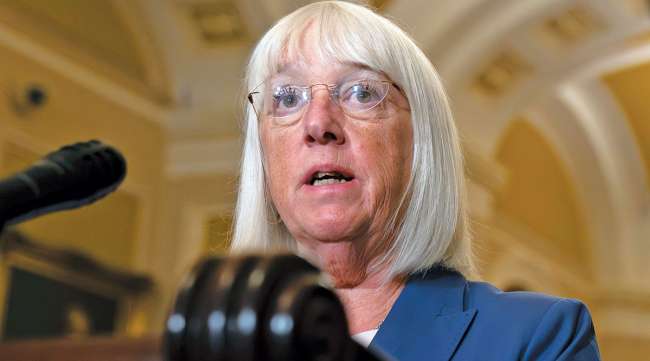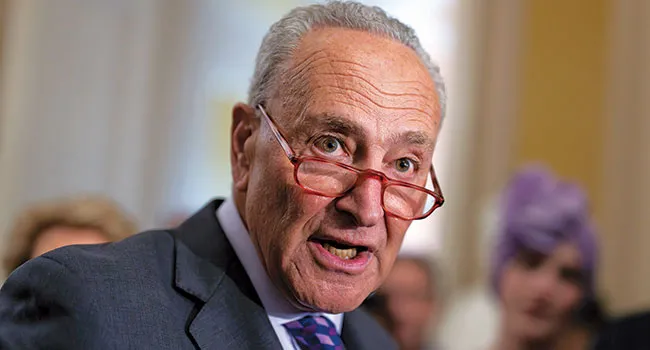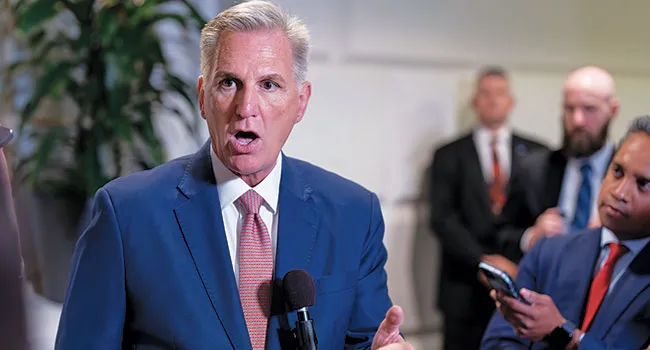Senior Reporter
Senate, House Differ on FY24 Funding Bills

[Stay on top of transportation news: Get TTNews in your inbox.]
With federal funding authority expiring at the end of the month, congressional leaders have yet to finalize their fiscal 2024 legislation.
While the Senate this month kicked off consideration of some of their funding bills, the House Republican caucus is split on a path forward specific to spending levels and social policies.
The slow-moving legislative process on Capitol Hill is pointing to the need for approving a short-term funding fix that would avert a partial government shutdown. Funding authority for most departments and agencies expires Sept. 30.
Senate Democratic leaders have elevated the status of short-term funding legislation while they debate fiscal 2024 bills linked to transportation, veterans and agriculture programs.
“We have been working closely together from day one to run an open, bipartisan process, to get input from all of our colleagues, and to make sure that everyone can make their constituents’ voices heard,” Sen. Patty Murray (D-Wash.), chairwoman of the Appropriations Committee, said Sept. 13. “We know our work is not done yet. But we are committed to showing the American people that this place can actually work,” she said, adding, “That members with different viewpoints can actually come together, in a timely, responsible way, to get our communities the resources they need, and to help people and solve problems — which is why so many of us got into politics in the first place.”
The Senate bill would dedicate $98.9 billion for the departments of Transportation and Housing and Urban Development. For transportation agencies, it would dedicate $20.2 billion for the Federal Aviation Administration, $16.8 billion for the Federal Transit Administration and $3.4 billion for the Federal Railroad Administration. The Federal Motor Carrier Safety Administration would receive nearly $1 billion under the legislation.

“There is only one way we will avoid a costly government shutdown: bipartisanship,” Schumer said. (J. Scott White/Associated Press)
Majority Leader Chuck Schumer (D-N.Y.), pressing his House counterparts to embrace bipartisanship, insisted his chamber intends to avert a government shutdown.
“The American people don’t want a shutdown. It would undo so much of our progress to lower costs, create millions and millions of jobs, and help our economy recover from the pandemic,” Schumer said Sept. 12. “So, I once again implore House Republican leadership to reject all-or-nothing tactics, reject unrealistic expectations, and refuse to cave to the extremist demands we’re hearing from 30 or so members way out on the fringe.”
“There is only one way we will avoid a costly government shutdown: bipartisanship,” the Senate leader continued.
On the House side, Speaker Kevin McCarthy (R-Calif.) has yet to schedule floor consideration for the transportation funding bill and other similar measures. Pointing to efforts meant to avert the possibility of a shutdown, the speaker called on his caucus to unify and arrive at final versions of the bills with senators. “The Senate: They want to spend a lot more money. The House: We’re much more conservative. We want to save the taxpayers’ money. We want to eliminate the wokeism. We want to protect our border. I know that makes it very hard on this administration when they want to have a wide open border. And doing so, we can change our differences,” said McCarthy on Sept. 14.
“I don’t think it’s productive to have a government shutdown during that time. I don’t know who wins and I don’t know how that — watching the shutdowns before — how is that productive to get the objectives that you want to achieve for the American public,” the speaker continued.

McCarthy said he didn't think a partial government shutdown would be productive. (J. Scott Applewhite/Associated Press)
The House version would dedicate $90.2 billion for the departments of Transportation and Housing and Urban Development. That includes nearly $1 billion for FMCSA, $19.5 billion for the FAA, $14.6 billion for the FTA and $1.4 billion for the FRA.
Per trucking policy, the House bill would deny funds for pursuing rules or regulations associated with equipping speed limiting devices on certain commercial vehicles. Both the House and Senate transportation bills would prohibit requirements — such as inward-facing cameras — for enrolling in a pilot training program for truck drivers younger than 21.
At the White House on Sept. 13, press secretary Karine Jean-Pierre focused on Congress’ role. “The shutdown should not happen. That is Congress’ job: to avoid a shutdown. I’ve said over and over again here at this podium just — for the past couple of minutes that these are vital programs that American families need,” she told reporters. “So that’s their basic duty. Their basic duty is to keep the government open.”
Want more news? Listen to today's daily briefing below or go here for more info:




